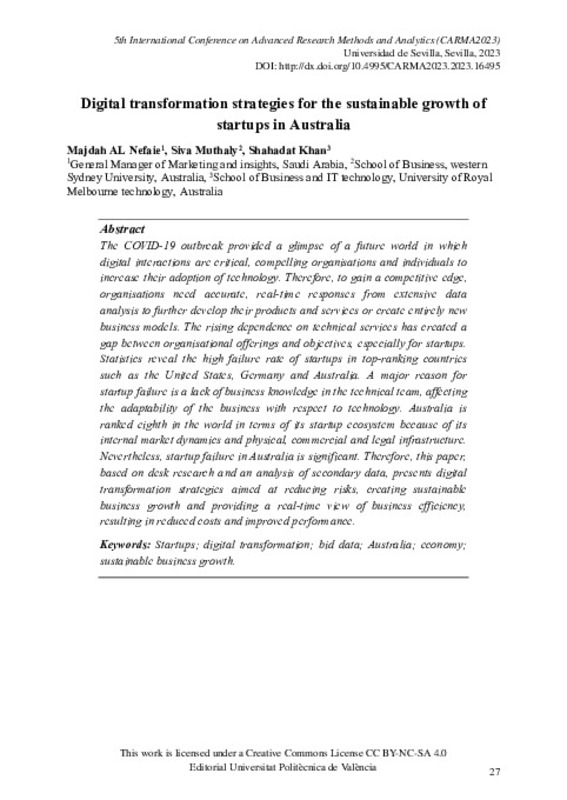JavaScript is disabled for your browser. Some features of this site may not work without it.
Buscar en RiuNet
Listar
Mi cuenta
Estadísticas
Ayuda RiuNet
Admin. UPV
Digital transformation strategies for the sustainable growth of startups in Australia
Mostrar el registro sencillo del ítem
Ficheros en el ítem
| dc.contributor.author | Nefaie, Majdah
|
es_ES |
| dc.contributor.author | Muthaly, Siva
|
es_ES |
| dc.contributor.author | Khan, Shahadat
|
es_ES |
| dc.coverage.spatial | east=133.775136; north=-25.274398; name=Austràlia | es_ES |
| dc.date.accessioned | 2024-01-10T09:06:12Z | |
| dc.date.available | 2024-01-10T09:06:12Z | |
| dc.date.issued | 2023-09-22 | |
| dc.identifier.isbn | 9788413960869 | |
| dc.identifier.uri | http://hdl.handle.net/10251/201688 | |
| dc.description.abstract | [EN] The COVID-19 outbreak provided a glimpse of a future world in which digital interactions are critical, compelling organisations and individuals to increase their adoption of technology. Therefore, to gain a competitive edge, organisations need accurate, real-time responses from extensive data analysis to further develop their products and services or create entirely new business models. The rising dependence on technical services has created a gap between organisational offerings and objectives, especially for startups. Statistics reveal the high failure rate of startups in top-ranking countries such as the United States, Germany and Australia. A major reason for startup failure is a lack of business knowledge in the technical team, affecting the adaptability of the business with respect to technology. Australia is ranked eighth in the world in terms of its startup ecosystem because of its internal market dynamics and physical, commercial and legal infrastructure. Nevertheless, startup failure in Australia is significant. Therefore, this paper, based on desk research and an analysis of secondary data, presents digital transformation strategies aimed at reducing risks, creating sustainable business growth and providing a real-time view of business efficiency, resulting in reduced costs and improved performance. | es_ES |
| dc.format.extent | 8 | es_ES |
| dc.language | Inglés | es_ES |
| dc.publisher | Editorial Universitat Politècnica de València | es_ES |
| dc.relation.ispartof | 5th International Conference on Advanced Research Methods and Analytics (CARMA 2023) | |
| dc.rights | Reconocimiento - No comercial - Compartir igual (by-nc-sa) | es_ES |
| dc.subject | Startups | es_ES |
| dc.subject | Digital transformation | es_ES |
| dc.subject | Bid data | es_ES |
| dc.subject | Australia | es_ES |
| dc.subject | Economy | es_ES |
| dc.subject | Sustainable business growth | es_ES |
| dc.title | Digital transformation strategies for the sustainable growth of startups in Australia | es_ES |
| dc.type | Capítulo de libro | es_ES |
| dc.type | Comunicación en congreso | es_ES |
| dc.identifier.doi | 10.4995/CARMA2023.2023.16495 | |
| dc.rights.accessRights | Abierto | es_ES |
| dc.description.bibliographicCitation | Nefaie, M.; Muthaly, S.; Khan, S. (2023). Digital transformation strategies for the sustainable growth of startups in Australia. Editorial Universitat Politècnica de València. 27-34. https://doi.org/10.4995/CARMA2023.2023.16495 | es_ES |
| dc.description.accrualMethod | OCS | es_ES |
| dc.relation.conferencename | CARMA 2023 - 5th International Conference on Advanced Research Methods and Analytics | es_ES |
| dc.relation.conferencedate | Junio 28-30, 2023 | es_ES |
| dc.relation.conferenceplace | Sevilla, España | es_ES |
| dc.relation.publisherversion | http://ocs.editorial.upv.es/index.php/CARMA/CARMA2023/paper/view/16495 | es_ES |
| dc.description.upvformatpinicio | 27 | es_ES |
| dc.description.upvformatpfin | 34 | es_ES |
| dc.type.version | info:eu-repo/semantics/publishedVersion | es_ES |
| dc.relation.pasarela | OCS\16495 | es_ES |








